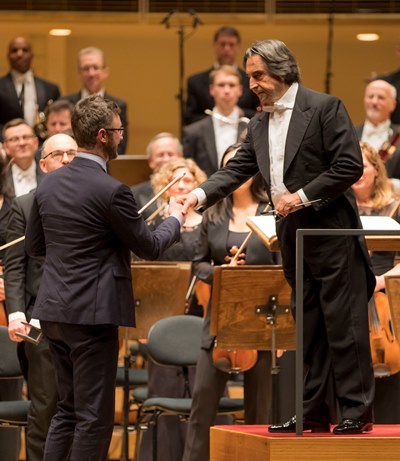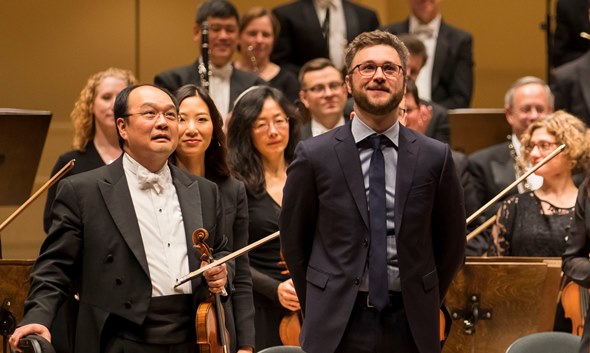In a many-splendored program, Muti and CSO match world premiere, Uchida’s Beethoven
Review: Chicago Symphony Orchestra conducted by Riccardo Muti; Mitsuko Uchida, piano. Through March 21 at Orchestra Hall.
By Lawrence B. Johnson
It’s no wonder the Chicago Symphony Orchestra packs the house when music director Riccardo Muti is on the podium. Seven years into his stewardship, it’s safe to say that when the main man is wielding the stick, memorable concerts are going to happen.
Latest case in point: the bravura world premiere of Samuel Adams’ “many words of love” framed by an elegant and emotionally charged performance of Beethoven’s Third Piano Concerto with soloist Mitsuko Uchida and a vivacious account of Schumann’s Fourth Symphony, which remarkably enough the CSO had not played since 2003.
 First and briefest, but ineffably of Muti, came the Overture to Rossini’s opera “La scala di seta,” the poised delicacies and springing rhythms of which the maestro and orchestra served up with equal measure of virtuosic precision and droll panache.
First and briefest, but ineffably of Muti, came the Overture to Rossini’s opera “La scala di seta,” the poised delicacies and springing rhythms of which the maestro and orchestra served up with equal measure of virtuosic precision and droll panache.
That aperitif set the stage for the Uchida-Muti collaboration on Beethoven. What a pleasure it was to find the veteran pianist liberated from her familiar dual duties as conductor from the keyboard in the concertos of Mozart, leaving the big picture in Muti’s care while she concentrated her great pianistic prowess and interpretive imagination on the solo role.
While Uchida fashioned the dramatically turbulent opening movement in arching lines, she also inflected Beethoven’s dark lyricism with the urgent impulse of speech. Technical precision and exquisitely shaped sound both contributed to a sense that the concerto had been taken back to the spirit, if not the hands, of its author.
The spacious central movement, which Beethoven marked Largo, was quite slow indeed, intensely ruminative – rather akin to the halting mystery that touches the slow movement of Beethoven’s Fourth Piano Concerto. It also provided an inverse display of Uchida’s virtuosity, in that she could sustain those drawn-out phrases and extract such depth of meaning from them.
 Here, as in the grand-scaled opening, Muti was Uchida’s keenly attuned interlocutor, matching her eloquent excursions with specific orchestral gestures. And all the way, right through the free-wheeling finale, the CSO met the pianist on the same high artistic plane, answering her brilliance with empathy and style.
Here, as in the grand-scaled opening, Muti was Uchida’s keenly attuned interlocutor, matching her eloquent excursions with specific orchestral gestures. And all the way, right through the free-wheeling finale, the CSO met the pianist on the same high artistic plane, answering her brilliance with empathy and style.
Muti deferred Adams’ new “many words of love” to a spotlighted position, as opener for the concert’s second half. Adams, along with Elizabeth Ogonek, is composer in residence with the Chicago Symphony, and this tumultuous 20-minute love poem for orchestra was a CSO commission.
The title comes from “Der Lindenbaum,” the fifth song in Schubert’s “Winterreise” (Winter Journey) cycle on verses of Wilhelm Müller. When the young protagonist passes by a linden tree on which he had once carved many words of love, he is stung by the pain of memory. Thus Adams’ brash and clever orchestral work evokes a compelling topography: the dynamic landscape of a mind reeling in love’s remembrance.
Beneath the surging surfaces of “many words of love” runs a deep lyrical current. It was greatly to Muti’s credit that a distinct aura of song was captured amid the emotional pitch and yaw. Adams’ assured orchestral writing seized the ear instantly and held it through storm and sigh. The sustained ovation accorded the new work bespoke a connection between a complex, thoroughly modernist essay and an audience surely more attuned to Schubert.
Muti capped off this ample and diverse program with Schumann’s Symphony No. 4 in D minor, itself a radical experiment in the mid-19th century. Although organized in four movements, the Fourth Symphony – which Schumann first considered calling a symphonic fantasy – flows along as if in a single musically integrated sweep. Muti and the Chicago Symphony delivered a radiant performance that went straight to the work’s heart of splendor, buoyancy and grace.
Related Link:
- Preview of the Chicago Symphony’s complete 2016-17 season: Read it at Chicago On the Aisle
Tags: Mitsuko Uchida, Riccardo Muti, Samuel Adams


